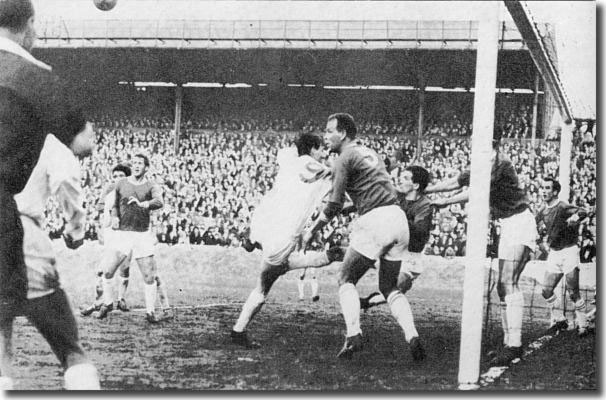 Part
1 - Kicker conspiracy - Results and table
Part
1 - Kicker conspiracy - Results and table
As 1964 dawned, Don Revie's brash
young Leeds United team were enjoying their status as Second Division
leaders and harboured strong hopes of ending a four-year exile from the
top flight.
However, Allan Brown's exciting Sunderland team were pushing them all
the way and when they took three points off Leeds in the two games between
the sides over Christmas 1963, it looked like the Wearsiders had established
the upper hand and would soon overtake United. Preston North End were
closely following in third place with Charlton Athletic in fourth.
The first weekend of January, though, brought Leeds temporary relief
from the rigours of the race at the top with an FA Cup third round tie
at Ninian Park against Cardiff City, whose ranks now included former Elland
Road star John Charles. The Bluebirds
were something of a bogey side in the Cup for Leeds, having won third
round ties 2-1 at Elland Road in three successive years in the late Fifties.
Bobby Collins had joined Jim
Storrie and Jack Charlton on
United's injured list, and the match resulted in another blow when club
captain Fred Goodwin broke his right leg in a collision with Charles in
the 20th minute. Eight minutes earlier Cardiff had also been reduced to
ten men when their outside-right, McIntosh, broke his left leg tumbling
over Gary Sprake in a challenge.
For all that, however, there was none of the sustained menace of the
Sunderland matches and Leeds laid the City hoodoo with a comfortable 1-0
victory. The Yorkshire Post: 'The man of the match was little Bremner.
There was not a phase of wing-half play in which he did not excel. He
deserved to be the winner of the game, with a blazing 30-yard drive that
positively whirred into the Cardiff net just before three quarter time.
He rallied United's straining defence magnificently in the struggle thereafter.'
With both Charlton and Goodwin out of action, there was some speculation
that Don Revie would dip his toe in the transfer market, but instead he
opted to blood 19-year-old Paul Madeley at centre-half. The contest against
Manchester City at Elland Road thus saw United fielding one of the youngest
defensive units ever seen in League competition: the average age of Sprake
(18), Reaney (19), Bell (26), Bremner (21), Madeley (19) and Hunter (20)
was a mere 20 years and 10 months.
Leeds were back on form, despite missing a hatful of chances. The only
goal of the game, from Weston just into the second half, gave the Whites
revenge for an early season defeat at Maine Road. It also meant that United
kept pace with Sunderland (4-1 winners over Bury) and Preston (2-1 over
Southampton), though Charlton lost ground by losing 2-1 at the Valley
against Newcastle.
Madeley had let no one down and kept his place for a trip to Swindon,
with goalkeeper Brian Williamson
getting a rare start in place of the injured Sprake. Leeds were two goals
down inside 14 minutes and required goals by Giles and Hunter to earn
a point. The equaliser came in the final minute when Hunter forced a header
home from a mass scramble in Swindon's goal area.
Sunderland won again, 3-0 at Manchester City, and looked ominously good,
although United retained top spot, if now only by dint of goal average.
Don Revie was increasingly concerned at the number of points squandered
and the lack of form, but again the Cup brought a brief respite, with
Leeds drawn at Elland Road against Football League champions Everton,
Bobby Collins' former club.
Either the challenge of playing one of the game's giants, or the magic
of the Cup, or maybe a bit of both, brought out the best in United and
they rose admirably to the occasion. Everton were undoubtedly the better
side, proving their greater class, but Leeds emerged with credit and with
greater luck might have pulled off a shock win.
Against the run of play, Lawson looked to have given the Yorkshiremen
a first half lead, but the goal was disallowed for offside against Bell.
Just before half time, however, it was the front man who did open the
scoring, although he was fortunate.
Eric Stanger: 'It was a freak goal for, in trying to clear Giles' lob
in the face of a twin challenge from Collins and Lawson, Harris kicked
the ball hard against Lawson's body whence it rebounded into the net.
A minute later Lawson should have won the game but, with West marooned
far from goal after a misunderstanding with Labone, he placed the ball
wide of the empty net.
back to top
'Lawson stands condemned for that bad miss, less so for one in the second
half when his shot from Collins' pulled back centre hit the helpless West
on the body and bounced clear. On the credit side Lawson, by his persistent
chivvying, did much to unsettle the Everton defence.'
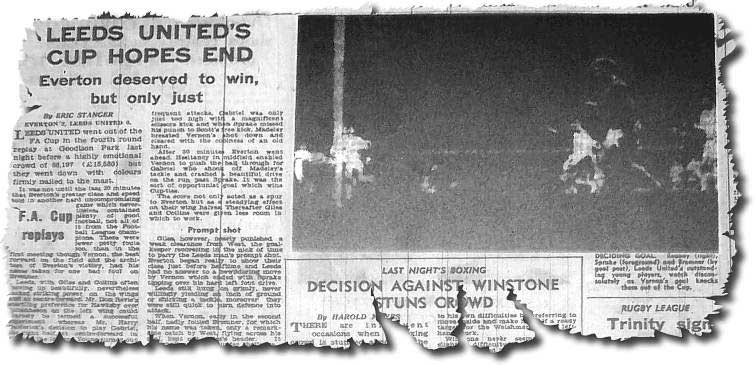 Despite
Everton's ability they struggled to get back on terms, and were very fortunate
when they did. With 11 minutes to go, the Merseysiders were awarded a
dubious penalty when Billy Bremner tackled Alex Scott. As Don Revie said,
'If it was a penalty then we should have had one in the first half when
Labone brought down Bremner.' In fact, that earlier incident had looked
a cast iron case for a spot kick with the Scot left flat on his face by
a clumsy challenge as he beat Everton's offside trap.
Despite
Everton's ability they struggled to get back on terms, and were very fortunate
when they did. With 11 minutes to go, the Merseysiders were awarded a
dubious penalty when Billy Bremner tackled Alex Scott. As Don Revie said,
'If it was a penalty then we should have had one in the first half when
Labone brought down Bremner.' In fact, that earlier incident had looked
a cast iron case for a spot kick with the Scot left flat on his face by
a clumsy challenge as he beat Everton's offside trap.
Sprake saved Scott's attempt from the spot, but was adjudged to have
moved. Roy Vernon took the second kick and sent the keeper the wrong way
to earn a replay at Goodison Park three days later.
Leeds again did themselves proud, but were always on the backfoot after
Jimmy Gabriel (switched from right-half to centre-forward for the night)
gave Everton the lead on the half hour mark. The decisive second goal
was a long time coming, but Vernon took it smartly with a shot through
a packed goalmouth12 minutes from time.
66,167 people were packed into the stadium, and had seen a gallant young
team keep classy opponents at bay, even if their own chances were limited
to the rare breakaway.
Leeds tried to carry their determined Cup form into the League the following
week against Cardiff. Don Revie opted to switch Willie
Bell to centre-half, calling up young Barrie
Wright at the expense of Paul Madeley.
Unfortunately, John Charles decided to show Leeds what they were missing,
following his second departure from the club. He gave a wonderful defensive
display to deny an insipid United attack more than the one goal poked
home by the rehabilitated Johanneson,
his first for nearly two months. However, the goal was only an equaliser,
for Charles' brother Mel had earlier given City the lead, and the game
ended in the seventh draw out of 14 matches at Elland Road.
Coupled with Sunderland's startling 6-0 trouncing of Swindon, the dropped
point was enough to end Leeds' nine-week occupation of top spot. It also
emphasised to Don Revie his team's chronic lack of finishing power. As
in so many games, United had totally dominated proceedings but squandered
a hatful of chances. The manager took immediate remedial action.
The two John Charles transfer deals in 1962 had generated a net gain,
bolstering improved takings at the gate. A profit of almost £13,000 was
recorded for the year to July 1963, and despite the earlier purchase of
Johnny Giles and debts of around £80,000, chairman Harry Reynolds persuaded
his fellow directors to open their wallets once more to boost the promotion
drive.
Revie took a transfer kitty and scurried over to Ayresome Park to sign
Middlesbrough's former England centre-forward Alan
'Peachy' Peacock, commenting, 'I have always been impressed by Peacock,
whose goal record speaks for itself. Naturally we hope that he will do
for United what he has done for Middlesbrough. He is a perfect type and
undoubtedly will settle down well at Elland Road.'
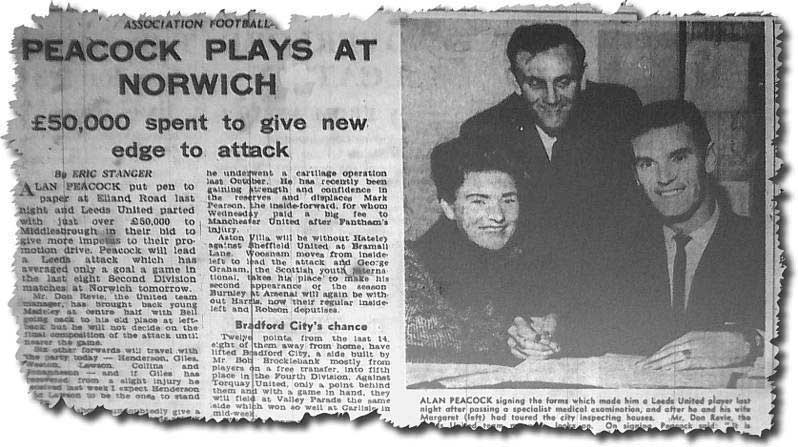 An
initial payment of £50,000 would rise by £5,000 if United could secure
promotion. It was a massive fee for Leeds, but still small beer for a
player of Peacock's stature in the game.
An
initial payment of £50,000 would rise by £5,000 if United could secure
promotion. It was a massive fee for Leeds, but still small beer for a
player of Peacock's stature in the game.
At 27, he had won four caps for England, two of them coming in the 1962
World Cup finals in Chile. He was originally a foil to the remarkable
goal scoring talents of Brian Clough, but took over Clough's No 9 shirt
when the latter moved to Sunderland in July 1961. Peacock had scored 126
goals for Boro in 218 Second Division games and was renowned as one of
the finest headers of the ball in the English game.
Bagchi and Rogerson: 'His heading ability alone was of the highest class,
and in normal circumstances he would have been far beyond Revie's resources.
Memorably described by Brian Glanville as "a tall, straight guardsman-like
figure even to the short haircut", he was just over 6ft tall, yet
his timing and vertical leap placed him up with Tommy Taylor, John Charles
and Nat Lofthouse as the finest exponents of the aerial arts since the
maestro Tommy Lawton.'
However, a cartilage operation in November had raised question marks
over his fitness and the move was seen as a major gamble. Peacock had
managed just five goals in the League, although two had come in his last
two games. Revie, though, knew that his team needed a regular goalscorer
if they were going to secure First Division football and was prepared
to take a risk.
The new man came straight into the United forward line for the game at
Norwich on 8 February, replacing Ian
Lawson. Leeds had to settle for another draw, but Peacock was an instant
success, flicking home a beautifully judged header, and bringing a vast
improvement to United's all round forward play with his intelligent link
work and use of the ball. It should have been a victory, for the Whites
let a two goal lead slip in the final 25 minutes. Sunderland won once
more, to edge further clear at the top, but it had been United's best
performance in the League for some weeks, boosting their confidence as
they moved into the vital run in.
They won the next game, at home to Scunthorpe, and welcomed back the
long absent Jack Charlton to bolster their challenge in the next match,
but a home draw with Huddersfield Town showed that they still had much
to do if they were to secure promotion. Sunderland were now two points
clear of Leeds at the top with Preston only a couple of points further
back, so the showdown on 3 February between United and North End assumed
massive importance for both sides. Leeds had the burden of going into
the game without Billy Bremner, starting a fortnight's suspension. Willie
Bell deputised at right-half, with the veteran Grenville Hair continuing
at left-back.
Preston, on the way to a FA Cup final at Wembley against West Ham, were
a strong side in desperate need of points to close the gap on United.
They roared into Leeds from the start, as if their very lives depended
upon it. Bobby Collins tried manfully to turn the tide, while Johnny Giles
and Jim Storrie had some useful moments, but Alan Peacock was not firing
on all cylinders, and Preston continually swept forward with long, incisive
passing to pin United back into desperate defence.
Eric Stanger in the Yorkshire Post: 'But for Sprake, who made
two thrilling saves from Dawson and another from Ashworth, Preston would
have had more than Ashworth's goal in the 20th minute to show for their
first half labours. The goal was typical of the close understanding between
Ashworth, playing his first game for a couple of months, and Dawson. When
Dawson broke through the middle Sprake could do no more than push out
his shot at full length and Ashworth, following up hard, had the ball
in the net from an acute angle before the Leeds defence could recover.
'For every attack Leeds mounted, Preston, through Lawton, Davidson and
Spavin in midfield, staged a dozen. Apart from Collins the Leeds forwards
wanted far too much time to make and collect their passes. Yet from one
move by Collins, Storrie got the ball into the net. The referee, Mr J
Finney of Hereford, ruled that Storrie had used his hands to bring the
ball under control - a decision against which both Storrie and Collins
protested so strongly that Collins was spoken to by the referee.
back to top
'A crashing volley from Giles and a header from Charlton, both of which
just cleared the bar, promised better things for Leeds at the start of
the second half. But their goose was cooked in the 57th minute when Sprake
made no move to a deliberate 25-yard drive by Wilson. Either he was unsighted
or he was under the impression that the ball would pass wide.
'Preston inevitably slackened a little - no side could maintain such
a cracking pace as they had set for a full 90 minutes. Giles hit the top
of the bar with a fierce shot from 30 yards but Leeds never looked like
being able to turn the tables.'
Preston were well worth the 2-0 win, and Leeds' chances of gaining promotion
seemed slimmer by the day. They still retained second spot from North
End, but only on goal average, and were now two points behind Sunderland,
with all three teams having played 32 games.
The next game, at home to Southampton, saw Storrie and Giles relegated
to the reserves as Don Revie rang the changes to find a winning combination
up front. He called up 17-year-old Jimmy
Greenhoff at right-half with Willie Bell moving to left-back after
Grenville Hair injured an ankle. Ian Lawson had asked for a transfer after
the arrival of Peacock, but had rejected a £15,000 move to Scunthorpe,
and was now reinstated up front, along with Don
Weston, fit after an ankle operation. If he had agreed terms with
Scunthorpe, Lawson would have been reunited with Cliff Mason, who moved
from Elland Road on 26 February in a £6,000 deal.
Revie had bought the Sheffield United full-back in 1962 as the club fought
relegation and offered his thanks to the veteran as the move was confirmed:
'He nobly did his stint towards getting us clear. He was a very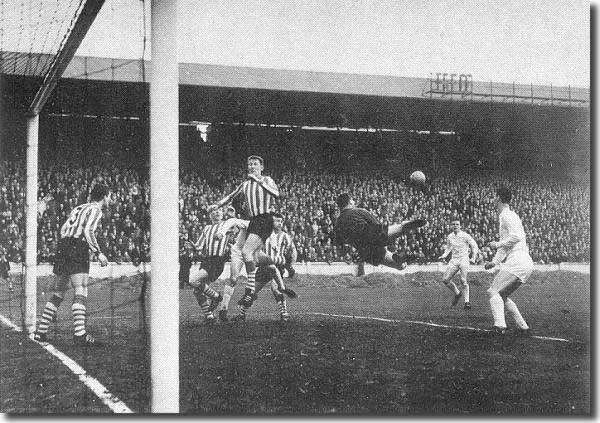 valuable player then. He came to see me before he went, and thanked me
for the treatment he had had at Elland Road. Indeed, he said he would
also write a letter of thanks to our directors. He was very sorry indeed
to go.'
valuable player then. He came to see me before he went, and thanked me
for the treatment he had had at Elland Road. Indeed, he said he would
also write a letter of thanks to our directors. He was very sorry indeed
to go.'
Lawson repaid Revie's faith with a goal in the first minute against Southampton,
but for the most part the four-man United attack struggled to make a mark.
They relied mainly on long lobs forward from Bobby Collins, but were constantly
stymied by deep lying Southampton defence. When Gary Sprake missed a centre,
allowing McGuigan to equalise, it looked like the usual story for Leeds,
but persistence eventually paid off, and in the last 15 minutes Collins
and Johanneson scored to ensure a 3-1 win that looked better on paper
than it had on the pitch. The game marked the first occasion that Leeds
had managed more than two goals in any game since beating the Saints 4-1
on their own pitch in October. Furthermore, with Preston inexplicably
losing by the only goal at Scunthorpe and Sunderland being held to a goalless
draw at home by Middlesbrough, valuable ground was gained and some confidence
restored.
Leeds themselves now had to visit Middlesbrough, and Don Revie brought
back Johnny Giles in place of Weston after the Irishman's telling game
for his country against Spain at Seville in midweek. The manager bolstered
his midfield to restore some control and composure. Jimmy Greenhoff deservedly
retained his place with Bremner missing the final game of his suspension.
The match marked a distinct return to form for the Whites as Ian Guild
reported in the Yorkshire Post:
'This was Leeds United at their best. On a rain soaked, greasy pitch
they regained the leadership of the Second Division with a display of
fast, attacking football that delighted their followers - all 30 busloads
of them … Leeds held the whip hand throughout. For this they had to thank
a 100 percent effort by the whole team, plus a magnificent exhibition
by the half-backs, Hunter, Charlton and Greenhoff, whose strength was
such that they always seemed to have the ball.
'Greenhoff, in particular, gave a polished exhibition of football. Aged
17, he worked tirelessly in attack and defence and one thrilling dribble
in which he beat six men only to be foiled at the last moment deserved
what would have been the goal of the match.
'Middlesbrough's defence, under almost constant pressure, held out until
the last four minutes when Leeds scored twice. Young Gates excelled himself
at centre-half, and it was no fault of his that Middlesbrough failed to
get a point. Lawson got the first goal for Leeds and Horsfield, Middlesbrough's
promising young centre-forward, equalised almost immediately with a well-placed
header.
'In the second half with the wind and rain in their backs Leeds, inspired
by Collins, launched attack after attack. Knowles, the Middlesbrough right
back, kicked off the line; Charlton thumped the crossbar from 25 yards
and for some time it appeared that Leeds were to be deprived of their
just desserts. As the game wore on, however, Middlesbrough began to falter.
So keen was the Leeds tackling and so quickly did they turn from defence
to attack that Middlesbrough were often reduced to moving the ball without
gaining ground. Four minutes from the end Peacock celebrated his return
to Ayresome Park by emerging from a ruck of players to head Leeds into
the lead for the second time. Three minutes later Giles, who had a splendid
game at outside-right, scored a magnificent third with a powerful shot
from a difficult angle.'
Don Revie commented afterwards: 'The players did very well indeed at
Middlesbrough, especially in such spoiling conditions. Once again they
gave the lot, and you cannot ask more. But I am not sure whether our supporters
at Middlesbrough didn't do even better for us. I thought the weight and
enthusiasm of our followers on such a terrible day were fantastic. Our
supporters were wonderful from the cheer we got as we came out right up
to coming off.'
Preston were playing Swansea in the FA Cup semi finals and Sunderland
went down 1-0 at Newcastle, leaving Leeds a point clear at the top of
the table and back in pole promotion position.
Billy Bremner celebrated his return from suspension a week later with
the second goal in a 3-1 win at home to struggling Grimsby, with Ian Lawson
once more getting the first and Peacock the third, after Town had taken
a shock lead early on.
Johnny Giles received rave reviews, with Phil Brown of the Yorkshire
Evening Post opining: 'Since he added more directness and starting
pace to his play, Giles has started to play really brilliantly. He had
a fine game a week ago at Middlesbrough, also on a very difficult pitch,
and on Saturday he had a blinder. The wingers were operating on the best
strips of turf, of course, and Giles made positively brilliant use of
his. He gave his full-back, Taylor, a terrible beating, going either side
of him or veering away into the middle with splendid control and balance.
If he goes on, and there is every sign of that in this thoughtful young
winger, he will become as popular as was that other little Irish right
winger of United's, David Cochrane.'
The man-management of Don Revie in his handling of Giles was notable
- when Matt Busby had dropped him it was taken as a slight and a reason
to leave; when Revie repeated the move, it revitalised the Irishman's
form, prompting him to greater heights.
Giles scored again in the next match, a vital Good Friday match at Newcastle,
although his first half effort was extremely fortunate. Giles described
the goal as 'the luckiest goal of my career. I'll never forget that goal,
Leeds were awarded a free kick 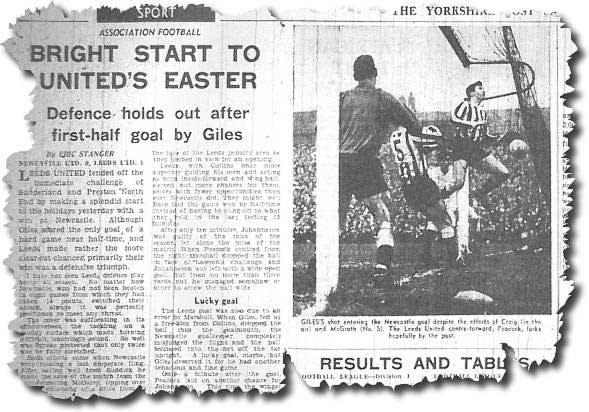 and
Bobby Collins played the ball out to me on the right flank. It was such
a windy day that the ball ran away from me to the byline. This forced
me to centre the ball hurriedly, and I was staggered when it curved into
the roof of the net.'
and
Bobby Collins played the ball out to me on the right flank. It was such
a windy day that the ball ran away from me to the byline. This forced
me to centre the ball hurriedly, and I was staggered when it curved into
the roof of the net.'
The match, however, was more a triumph of concerted defence than one-man
supremacy.
The Yorkshire Post's Eric Stanger claimed he had 'not seen Leeds'
defence play better all season. No matter how Newcastle, who had not been
beaten in eight games from which they had taken 14 points, switched their
attack, always it was perfectly positioned to meet any threat. The cover
was suffocating in its effectiveness, the tackling on a muddy surface,
which made turning difficult, unerringly sound. So well was Sprake protected,
that only twice was he fully stretched. Both efforts came when Newcastle
were making a last desperate fling. After saving well from Suddick, he
made the save of the match from the fierce shooting McGarry, tipping over
a real whizz bang of a drive from 20 yards out. Leeds deliberately planned
their defence in-depth. Bremner seldom was seen beyond the half way line
and helped Hunter firmly to bolt the middle. Bremner, Charlton and Bell
were outstanding for their coolness in a tight corner, and Bell, particularly,
earned great praise since he had to deal with Newcastle's most dangerous
wing of Hilley and McGarry.'
Leeds made the better chances, however, from their limited possession,
and after ten minutes Johanneson missed an open goal from three yards.
The chance came when Marshall dropped Peacock's centre under pressure
from Lawson, who later came close to adding a second. Charlton's presence
made Leeds much tighter at the back and United now represented a tough
nut to crack.
back to top
The run of four straight wins at such a crucial time of the season represented
the most impeccable of timing, leaving Leeds top and four points clear
of third placed Preston with just six games remaining. However, the gap
narrowed by a point over the remaining two Easter games as North End reaped
maximum points from home games with Manchester City and Grimsby Town.
They even moved temporarily into second place, for their match with Grimsby
was a morning kick off. Sunderland dropped another point in a 2-2 draw
at Rotherham to leave them still second, three points behind United but
with a game in hand.
Leeds dropped a point in a 1-1 draw at Derby when Cullen scored from
a speculative overhead kick with 90 seconds remaining to equalise Peacock's
81st minute headed effort, but their win in the return game at home to
Newcastle was rather more noteworthy.
Newcastle finished with one man in hospital and another limping, but
Leeds just about deserved to win their third hard match in four days.
For once, however, there was no malice attached to the game and left-back
Dalton confirmed he had broken his right tibia after himself kicking the
sole of Giles' boot.
A crowd of 40,105 packed in to Elland Road to rally the Whites although
there were many Geordies in the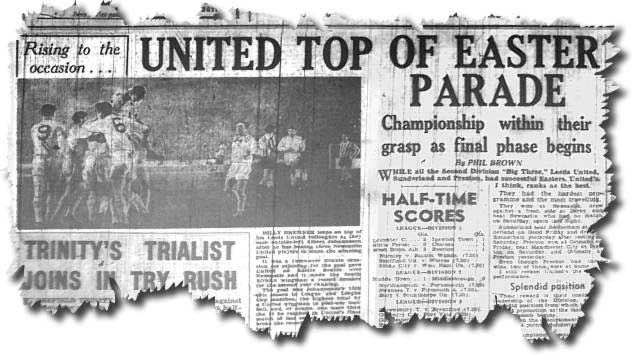 ground to watch a breathtaking contest.
ground to watch a breathtaking contest.
Leeds took a second minute lead after Charlton's long free kick into
the Newcastle goal area. Geordie defenders charged down shots from both
Giles and Collins before Weston was able to force the ball home.
The goal calmed Leeds' nerves for a while and they began moving smoothly
from midfield with Reaney and Bell supplementing Giles and Johanneson
on the flanks. But the jitters soon re-emerged when Newcastle equalised
in the 38th minute with a soft effort. Wing-half Jim Iley lobbed a long
range free kick into the goalmouth and, with Sprake and his defenders
leaving matters to each other, the ball slowly crossed the line, with
the Leeds ranks in disarray.
They continued to press but did so raggedly and looked like they were
going to miss out at a crucial stage of the season. However, with the
match entering the last 15 minutes, Albert
Johanneson scored a memorable goal to turn one point into two and
cement Leeds' hold on top spot.
Johnny Giles: 'Our second goal was scored by Johanneson and ranks as
one of the most dazzling individual efforts I have ever seen. Albert was
surrounded by three Newcastle defenders as he brought down a long pass
through the middle and it looked certain that he would be forced away
from goal. Yet in the space of five yards, he side stepped them all, one
after the other, and nonchalantly slipped the ball past the goalkeeper
as he came off his line. Albert was always such a nervous type of person
off the field that it was unbelievable that he was capable of expressing
himself like that on the field. That was his fifteenth goal of the season,
the highest total by a Leeds winger since the war.'
| |
Top of Second Division - 30 March 1964 |
| |
Pos
|
|
P
|
W
|
D
|
L
|
F
|
A
|
Pts
|
| |
1st
|
Leeds
United |
38
|
21
|
14
|
3
|
63
|
32
|
56
|
| |
2nd
|
Sunderland |
37
|
22
|
9
|
6
|
71
|
32
|
53
|
| |
3rd
|
Preston
North End |
38
|
22
|
9
|
7
|
74
|
47
|
53
|
| |
4th
|
Charlton
Athletic |
37
|
18
|
9
|
10
|
70
|
62
|
45
|
| |
5th
|
Newcastle
United |
37
|
18
|
5
|
14
|
66
|
58
|
41
|
| |
6th
|
Manchester
City |
38
|
15
|
9
|
14
|
74
|
62
|
39
|
| |
7th
|
Rotherham
United |
36
|
16
|
6
|
14
|
79
|
65
|
38
|
| |
8th
|
Portsmouth |
35
|
15
|
8
|
12
|
70
|
58
|
38
|
It was a tremendous performance in a marvellous match and with four games
left to play, United needed five more points to clinch promotion because
of their far superior goal average.
A routine win at Elland Road against Leyton Orient followed, although
the Londoners' 77th minute consolation goal gave the crowd some nervous
minutes after headed goals by Giles (32 minutes) and Weston (47) had seemed
to signal an easy win.
Eric Stanger covered the salient points in the Yorkshire Post:
'Leeds, in Bremner and Collins, have two of the best link men in the business
and although Collins was a full half hour finding his stride, when he
did Leeds were always much quicker to turn defence into attack. It was
from Collins' long centre to the far post that Giles was able to dart
in and head the first goal, and it was Giles who provided the centre for
Weston to head the second off the underside of the bar.
'Bremner gave an outstanding display for Leeds with his fellow wing-half,
Hunter, not so very far behind him for the certainty of his tackling and
for the help he gave Charlton, who laboured for a long while under a knock
on the thigh which finally caused his removal to outside right in the
closing minutes.
'Just before that Gregory had scored for Leyton when Sprake failed to
cut out McDonald's corner. Sprake may not have been entirely to blame,
but for a young goalkeeper of such high promise he has been dreadfully
prone to simple error of late. Possibly in this instance it was due to
lack of concentration through being underemployed for most of the game.'
Preston went down 4-2 at Rotherham and their challenge was fading fast,
but Sunderland, beating Swansea and then winning at Leyton 5-2 on the
Monday night, still represented a danger to title ambitions. While a single
point from the final three matches would almost definitely confirm Leeds'
promotion, they required maximum points to make certain of the Second
Division championship.
| |
Top of Second Division - 10 April 1964 |
| |
Pos
|
|
P
|
W
|
D
|
L
|
F
|
A
|
Pts
|
| |
1st
|
Leeds
United |
39
|
22
|
14
|
3
|
65
|
33
|
58
|
| |
2nd
|
Sunderland |
39
|
24
|
9
|
6
|
77
|
34
|
57
|
| |
3rd
|
Preston
North End |
39
|
22
|
9
|
8
|
76
|
51
|
53
|
| |
4th
|
Charlton
Athletic |
39
|
18
|
10
|
11
|
72
|
65
|
46
|
| |
5th
|
Newcastle
United |
39
|
19
|
5
|
15
|
72
|
63
|
43
|
| |
6th
|
Manchester
City |
39
|
16
|
9
|
14
|
77
|
63
|
41
|
| |
7th
|
Rotherham
United |
37
|
17
|
6
|
15
|
85
|
72
|
40
|
As preparation for the first of those three vital matches, United welcomed
Juventus to Elland Road for a midweek friendly and emerged creditably
with a 1-1 draw, although the Italians rested some of their key men, including
the Argentinian inside-forward Omar Sivori, and took things relatively
easy. The match was one of a number organised against Italian clubs as
part of the series of transfer deals involving John Charles. It was interesting
to see Leeds face such high-class continental opposition and they coped
admirably with the occasion.
However, the friendly was very much an hors d'oeuvre, serving only to
whet the appetite for the main course - the
weekend's trip to Swansea and a potential promotion party.
In a classic case of anti-climax, Leeds, giving 19-year-old Terry Cooper
his debut in place of the injured Albert Johanneson, dispelled any nerves
with a three goal burst inside 30 minutes and then simply squeezed out
the game to finish 3-0 winners, thus confirming promotion back to Division
One after a four year gap, with Preston and Sunderland both locked in
0-0 draws.
United, however, were hungry for a trophy to mark their triumph, as Phil
Brown reported in the Yorkshire Evening Post: 'Leeds United players
are now determined to win the championship of the Second Division as well
as promotion. Team manager Don Revie told me: "We have the two matches
left and so have Sunderland. We are two points ahead of them, 60 to 58,
so we'll never have a better chance. It would ground the season for the
club, and for me personally, if we can beat Sunderland to the title."
'Chairman Mr Harry Reynolds has been urging that United go for the title
for months past, of course. He told me: "United have won so little
that ranks in football. Ideally I want them to win this season's title
and we have a great chance but in all the years since the club entered
the League in 1920 we have won but one honour - the Second Division championship
in 1923/24, which is 40 long years back."
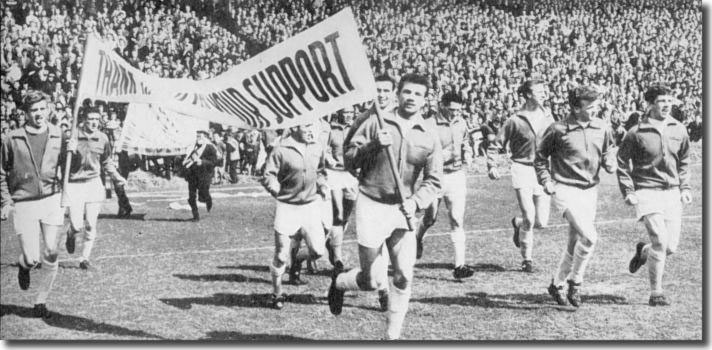 'Bobby
Collins, United's iron man captain, told me: "Not to worry, I've
passed the word among the lads myself. We'll beat Plymouth at Elland Road
on Saturday and Charlton at Charlton the Saturday after for the bosses
as well as ourselves."
'Bobby
Collins, United's iron man captain, told me: "Not to worry, I've
passed the word among the lads myself. We'll beat Plymouth at Elland Road
on Saturday and Charlton at Charlton the Saturday after for the bosses
as well as ourselves."
back to top
'Behind Collins' voice I heard Jack Charlton saying less printably(!)
that United would dispose of both Plymouth and Charlton lethally.'
Before the kick off against Plymouth, the Leeds players took to the field
carrying a huge banner thanking the crowd for their support all season
and took a lap of honour, but then contrived to stumble haplessly to a
1-1 draw against a side who were battling to avoid relegation. Maybe it
was a delayed reaction after the nerves of a torrid season, or the result
of too much celebrating after the Swansea triumph. Whatever the reason,
United looked anything but championship contenders.
Bell drove home from 30 yards after 18 minutes but Leeds struggled to
rise from their torpor with Bremner and Collins rendered ineffective by
tight marking and Giles and Johanneson strangely out of touch on the wings.
All four had enjoyed tremendous seasons, but were suddenly shadows of
their normal selves.
Sprake gifted Argyle an equaliser on the hour with one of the mistakes
that were becoming all too regular - he let left-winger Jennings' gentle
shot slip through his grasp and into the net, and United never looked
likely to recover the lead.
Elsewhere Sunderland were duly beating Charlton 2-1 at home to make their
own promotion mathematically certain and set up a last day battle for
the Second Division title. The equation was simple: if Leeds won at Charlton
or matched Sunderland's result at Grimsby, they would win the title. If
Sunderland could outpoint Leeds, the championship would go to Roker.
Revie recalled Terry Cooper for the game, choosing to leave out Albert
Johanneson, but otherwise Leeds were unchanged. Indeed, their 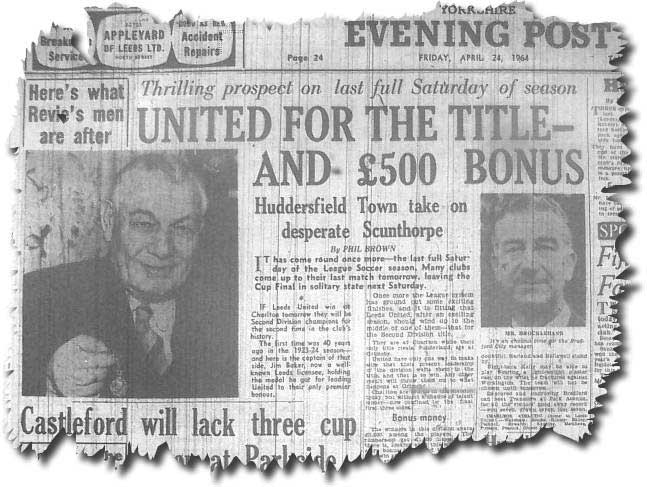 line
up over the last five games of the season had been remarkably stable,
with only Johanneson and Cooper not ever-present, leading to consistency,
confidence and just the single dropped point.
line
up over the last five games of the season had been remarkably stable,
with only Johanneson and Cooper not ever-present, leading to consistency,
confidence and just the single dropped point.
With calm assurance, United soon took control of the game on a soft,
holding pitch. They were able to pierce the Athletic defence seemingly
at will, yet were able to keep the Londoners' own assaults firmly at arm's
length. Their dominance never faltered.
They moved sharply and incisively and had Charlton at sixes and sevens.
Alan Peacock again showed his value after 36 minutes by finishing off
a splendid passing movement involving Collins and Weston to open the scoring.
It was the 69th minute before United scored again, and once more it was
Peacock, heading Cooper's cross from the right neatly home to bag his
fourth goal in three matches, his seventh in eight and eighth in all since
his big money move from Middlesbrough.
But if Peacock had provided the cutting edge, it was the irrepressible
Bobby Collins who took the honours. As he had throughout virtually every
game in a taxing year, the veteran Scot covered almost every blade of
grass as he drove his troops on. It was he who saw to it that Charlton
found no way back into the contest, even after they got a late penalty
when Jack Charlton slid in illegally on Matthews. Edwards drove his spot
kick wide, but one had the impression that Athletic had long since been
resigned to defeat.
Sunderland's 2-2 draw at Grimsby Town was rendered irrelevant - Leeds
had found the most immense form at just the right time, capturing 18 out
of the final 20 points on offer. All season long, despite the odd stumble,
they had demonstrated they were worthy title winners, losing just three
games, all away from home to sides in the top six, and conceded only 34
goals. Their points total of 63 was the highest in the Second Division
since Spurs' 70 in 1920, and a club record for Leeds, as was the number
of defeats, both home and away.
They had won the Second Division championship exactly forty years after
their only other success in that same competition, and just two years
after they nearly plummeted into Division Three for the first time. This
was heady stuff indeed, and Leeds United Football Club had their foot
firmly on the first step of a truly remarkable period in their history,
under the leadership of 36-year-old Don Revie, simply the best young manager
around, all set to pit his wits against the country's best.
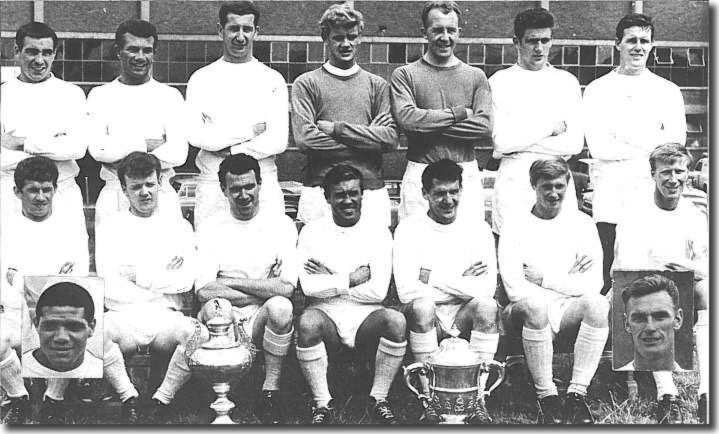 The
playing style that Leeds United had mastered and exploited to the optimum
was neither attractive nor exciting, but it was certainly effective and
pioneered the way for much of the football that would hold sway in England
over the next decade. The Second Division had seen nothing of its like
before, and Division One was about to get a dose of the same unpleasant
medicine.
The
playing style that Leeds United had mastered and exploited to the optimum
was neither attractive nor exciting, but it was certainly effective and
pioneered the way for much of the football that would hold sway in England
over the next decade. The Second Division had seen nothing of its like
before, and Division One was about to get a dose of the same unpleasant
medicine.
back to top
Part 1 - Kicker conspiracy - Results
and table
Other Football Highlights from 1963/64
- Jimmy Dickinson finally retired at the age of 39, having made a record
764 league appearances for Portsmouth, his only club. He made 48 appearances
at left half for England, with only the emergence of Duncan Edwards
displacing him. In a career spanning almost 20 years he was never spoken
to by a referee, let alone booked
- Football was rocked to its foundations on the morning of Sunday 12
April when The People newspaper revealed that three Sheffield
Wednesday players, Peter Swan, Tony Kay and David Layne, had made sure
Wednesday lost 2-0 to Ipswich in December 1962. Each of them won £100
by betting on the result. It was later revealed that a number of other
players were also involved and they were nearly all suspended for life,
with 10 of them convicted at Nottingham Assizes on 26 January 1965
- Tottenham's defence of the European Cup Winners' Cup lasted as long
as their first match, against Manchester United. Spurs won 2-0 at home,
but in the second leg they lost Dave Mackay for the rest of the season
with a broken leg and finished 4-1 losers on the night. United lost
in the next round to Sporting Club of Portugal, who went on to win the
trophy
- As well as the loss of Mackay, Spurs had other problems to contend
with as their Double team started to fall apart. Terry Medwin was injured
on a summer tour and missed the whole season, 37-year-old Danny Blanchflower
announced his retirement, Bobby Smith was transferred to Brighton in
May and 27-year-old John White was killed by lightning on a golf course
- 66 goals were scored in 10 First Division matches on Boxing Day. Fulham
beat Ipswich 10-1 and Blackburn beat West Ham 8-2
- First Division West Ham struggled to a 3-2 victory over Second Division
Preston North End in the FA Cup final. Preston played the far better
football in the first half and Howard Kendall, the youngest player to
appear in a Cup final this century (aged 17 years and 345 days), dominated
midfield for the Lancashire club, who twice took the lead
- Since the inauguration of the Scottish League Cup in 1946-47, the
Scottish treble had only been achieved once, by Rangers in 1949. They
repeated the feat this year and finished the league season six points
clear of Kilmarnock
- England had an extremely good season, although they had a number of
set backs. They won 4-0 in Wales, beat a Rest of the World XI 2-1 (including
Alfredo di Stefano, Ferenc Puskas, Eusebio, Denis Law and Jim Baxter)
at Wembley and thrashed Northern Ireland 8-3 (in the first international
at Wembley to be played entirely under floodlights) thanks to four goals
by Jimmy Greaves and a hat trick from Terry Paine. They lost 1-0 to
Scotland, but then hit form again by beating Uruguay (2-1), Portugal
(4-3), the Republic of Ireland (3-1) and the USA (10-0). They finished
on a low note, however, by losing 5-1 to Brazil and 1-0 to Argentina.
The struggle against the two powerful South American teams boded badly
for the 1966 World Cup finals
- Denis Law was elected European Footballer of the Year
- After winning promotion to the First Division in 1962, Liverpool,
under their charismatic manager Bill Shankly, won the League title,
finishing four points clear of runners-up Manchester United. Three straight
wins over the Easter period virtually wrapped the championship up
- Jim Fryatt scored the fastest goal ever in first class football on
25 April, opening the scoring for Bradford Park Avenue against Tranmere
after just four seconds
- Spain became the second winners of the European Nations Cup, beating
holders the USSR 2-1 in the final












 Part
1 - Kicker conspiracy - Results and table
Part
1 - Kicker conspiracy - Results and table
 Despite
Everton's ability they struggled to get back on terms, and were very fortunate
when they did. With 11 minutes to go, the Merseysiders were awarded a
dubious penalty when Billy Bremner tackled Alex Scott. As Don Revie said,
'If it was a penalty then we should have had one in the first half when
Labone brought down Bremner.' In fact, that earlier incident had looked
a cast iron case for a spot kick with the Scot left flat on his face by
a clumsy challenge as he beat Everton's offside trap.
Despite
Everton's ability they struggled to get back on terms, and were very fortunate
when they did. With 11 minutes to go, the Merseysiders were awarded a
dubious penalty when Billy Bremner tackled Alex Scott. As Don Revie said,
'If it was a penalty then we should have had one in the first half when
Labone brought down Bremner.' In fact, that earlier incident had looked
a cast iron case for a spot kick with the Scot left flat on his face by
a clumsy challenge as he beat Everton's offside trap. An
initial payment of £50,000 would rise by £5,000 if United could secure
promotion. It was a massive fee for Leeds, but still small beer for a
player of Peacock's stature in the game.
An
initial payment of £50,000 would rise by £5,000 if United could secure
promotion. It was a massive fee for Leeds, but still small beer for a
player of Peacock's stature in the game. valuable player then. He came to see me before he went, and thanked me
for the treatment he had had at Elland Road. Indeed, he said he would
also write a letter of thanks to our directors. He was very sorry indeed
to go.'
valuable player then. He came to see me before he went, and thanked me
for the treatment he had had at Elland Road. Indeed, he said he would
also write a letter of thanks to our directors. He was very sorry indeed
to go.' and
Bobby Collins played the ball out to me on the right flank. It was such
a windy day that the ball ran away from me to the byline. This forced
me to centre the ball hurriedly, and I was staggered when it curved into
the roof of the net.'
and
Bobby Collins played the ball out to me on the right flank. It was such
a windy day that the ball ran away from me to the byline. This forced
me to centre the ball hurriedly, and I was staggered when it curved into
the roof of the net.' ground to watch a breathtaking contest.
ground to watch a breathtaking contest. 'Bobby
Collins, United's iron man captain, told me: "Not to worry, I've
passed the word among the lads myself. We'll beat Plymouth at Elland Road
on Saturday and Charlton at Charlton the Saturday after for the bosses
as well as ourselves."
'Bobby
Collins, United's iron man captain, told me: "Not to worry, I've
passed the word among the lads myself. We'll beat Plymouth at Elland Road
on Saturday and Charlton at Charlton the Saturday after for the bosses
as well as ourselves." line
up over the last five games of the season had been remarkably stable,
with only Johanneson and Cooper not ever-present, leading to consistency,
confidence and just the single dropped point.
line
up over the last five games of the season had been remarkably stable,
with only Johanneson and Cooper not ever-present, leading to consistency,
confidence and just the single dropped point. The
playing style that Leeds United had mastered and exploited to the optimum
was neither attractive nor exciting, but it was certainly effective and
pioneered the way for much of the football that would hold sway in England
over the next decade. The Second Division had seen nothing of its like
before, and Division One was about to get a dose of the same unpleasant
medicine.
The
playing style that Leeds United had mastered and exploited to the optimum
was neither attractive nor exciting, but it was certainly effective and
pioneered the way for much of the football that would hold sway in England
over the next decade. The Second Division had seen nothing of its like
before, and Division One was about to get a dose of the same unpleasant
medicine.